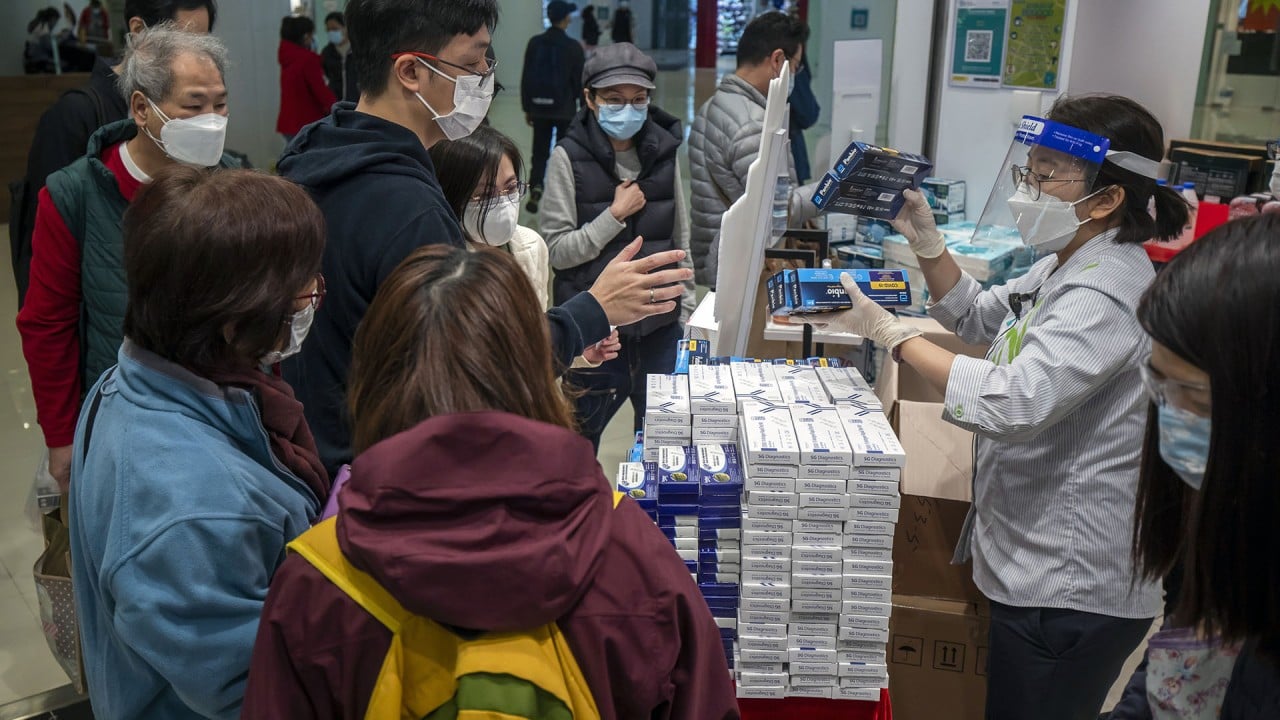
Delayed Covid-19 funerals spell heartache for Hong Kong families, with some bodies decomposing after weeks in temporary storage facilities
- Funeral parlours say they are overwhelmed by surge in deaths and question temporary mortuary facilities
- But government department says funeral halls are fully booked only on weekends and public holidays
His face was shrunken and had turned slightly black, and his body, wrapped in plastic, lay on a cold table at the hospital mortuary. It was a month after his death.
Chan’s family had failed to secure a place at a funeral home and could only arrange for simple Taoist rites to be performed outside the hospital for her grandfather on April 15.
“He could have looked great at his funeral, but he ended up looking like this. I was very sad and we could do nothing about it,” said Chan, 28, a clerk. “Of course we would love to provide the best for our family members, even when they have died.”
Hong Kong funeral industry warns of coffin shortage despite increase in supply
The surge in deaths during the fifth wave, which began last December, left funeral parlours unable to cope and fully booked till late May. By the time families were able to proceed with funeral arrangements, some were shocked to find that their loved ones’ bodies had begun to decompose. The temporary storage units set up by the government were not designed to keep bodies for very long.
Hong Kong’s fifth wave of the pandemic saw about 9,000 deaths mainly in February and March, when confirmed infections surged past 50,000 a day.
The Department of Health revealed on Wednesday that about 1,800 bodies had been collected between March and April, but around 1,100 that were ready to be claimed still remained in public mortuaries and storage facilities.
Kwok Hoi-bong, chairman of the Funeral Business Association, said it would take about three weeks to clear the bottleneck, with families already making funeral arrangements.
“But all the funeral homes in Hong Kong can only handle about 120 bodies per day in total,” he said. “Funeral services are fully booked until late May.”
To cope with the sharp increase in bodies during the fifth wave, the Department of Health set up refrigerated containers near public hospitals and Fu Shan Public Mortuary in Sha Tin.
There was room for more than 6,200 bodies to be stored as of Friday, including 506 storage spaces at the department’s three public mortuaries.
Leung Pak-wai, manager of the Kowloon Funeral Parlour in Tai Kok Tsui, said many of the bodies kept in containers next to Fu Shan Public Mortuary had begun decomposing, exuding a strong odour.
“With many families claiming bodies, the containers kept opening and closing, which may have affected the temperature,” he said. “You can smell the odour when you walk near the mortuary.”
Hong Kong police to help families collect bodies of loved ones in public hospitals
Leung said about one or two in 10 bodies handled by his funeral parlour had begun decomposing by the time they were claimed. The parlour kept the bodies in its own freezers until the funerals.
“Other funeral service providers who do not have their own freezers may be dealing with more decomposing bodies,” he said, adding that it cost “a few thousand dollars” to keep a body for two weeks at the funeral parlour.
“Rather than pay extra, they prefer keeping the bodies at the temporary containers until the day of the funeral,” he said.
The department said decomposition of dead bodies was “an inevitable natural phenomenon” and could not be prevented at the temporary storage containers.
“Cold chambers at public mortuaries and refrigerated containers at storage facilities are designed for short-term storage of dead bodies only,” it said in a statement, adding that it encouraged families to claim the bodies as soon as possible.
It said it conducted regular checks of the facilities’ temperature every day and installed screens at the doors of containers to slow down the rate of decomposition.

Kwok said the temporary storage facilities were set up outdoors and were heated up by the sun.
“The government’s containers are maintained at 3 to 4 degrees Celsius, which is an appropriate temperature,” he said. “But the weather has become warmer and sunlight may affect the performance of the freezer.”
He suggested that the government erect marquees to cover the containers and keep them cool, and build more funeral homes.
The Food and Environmental Hygiene Department said it had increased the available daily cremations to more than 300 at its five crematoriums.
About 200 bodies could be identified each day, and the next of kin could obtain a certificate of cremation two working days after identifying the body.
Hong Kong funeral homes decline make-up, viewing services for Covid-19 victims
Indicating there was ample capacity at funeral parlours, the department said 45 per cent of the 134 service halls at the city’s seven licensed parlours were available for booking.
The service halls were fully booked only on weekends and public holidays over the next two weeks, it added.
But Kwok said only the bigger halls were still available, whereas families preferred smaller ones to keep funerals small during the pandemic. Most also preferred holding the funerals over weekends and on public holidays.
Most Hong Kong families hold wakes for only a day. Kwok said some traditional families chose to hold the funeral on specific dates they considered auspicious.
“They may wish to hold a wake and vigil according to traditional rites, which might further delay other funerals,” he said.


